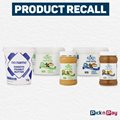Peanut butter, a consumer favourite, is making South African headlines after a product recall was issued recently.
This week, the National Consumer Commission (NCC) announced an investigation into five peanut butter brands it recalled for having higher levels of Aflatoxin, a potentially harmful compound.
In addition, Woolworths is investigating an incident involving its juice, following an image circulating on social media of what appeared to be alleged foreign substances in it, raising concerns about product quality and safety.
According to Molebatsi Langa, head of strategic retail accounts at Old Mutual Insure, there are significant risks facing businesses and brands in today’s environment, given the introduction of regulations like the Consumer Protection Act, increased vigilance by regulatory bodies such as the NCC, and consumers and policyholders being more aware of their legal rights.
“Product recalls can be costly to a company. Against the heightened risks in today’s climate, any company that manufactures, distributes, or supplies consumer products should strongly consider obtaining both Product Liability and Recall Insurance,” says Langa.
She explains that product recall insurance is intended to protect companies from financial loss and bankruptcy resulting from product recalls, while product liability insurance can help cover the cost of a lawsuit if a product is recalled after a customer is injured; however, it will not cover the cost to recall the product.
“In addition, product liability insurance covers the cost of compensating anyone who is injured by a faulty product that the business designs, manufactures or supplies, and product liability cover does not always include cover for product recalls.”
She says that product recall insurance is triggered when a product poses severe health risks and/or death to users of the product, and that costs involving shipping, warehouse, disposal, and restocking can quickly add up.
“Product recall insurance covers expenses related to recalling a product once it has been released to the public, so it can help pay for the cost to collect and dispose of a contaminated product,” she says.
Langa explains that a policyholder cannot extend a normal General Liability policy or Section to cover the risk of recalls, and that cover may vary depending on the provider. Typically, it covers the loss arising out of the recall of a product as a result of accidental contamination, malicious product tampering, accidental omission or substitution of a substance, intentional or malicious damage by an employee, and error in design, storage or labelling.
She adds that while Public Liability insurance is relatively inexpensive, not having this type of cover is a running a large risk.
“While not compulsory in South Africa, it is good business practice to have Public Liability including Products Liability insurance where applicable covering all your risk exposures if you are a business owner with a warehouse, mall, restaurant or shop, manufacturing plant, or if you are providing a professional service,” concludes Langa.









































